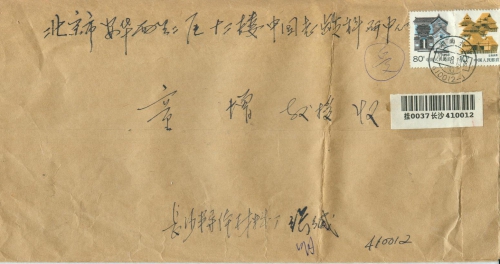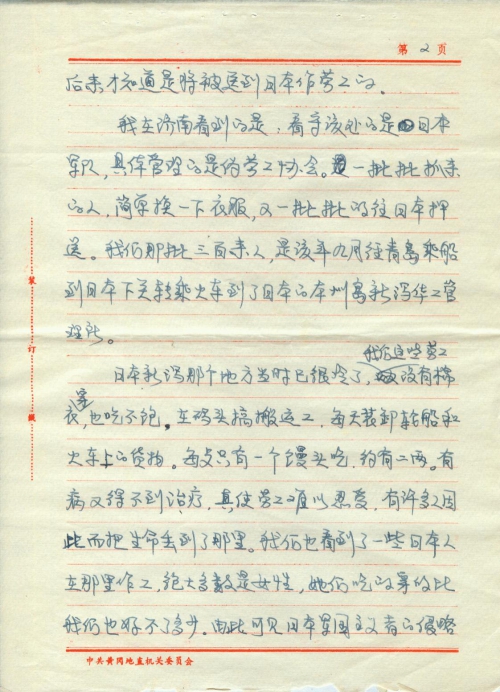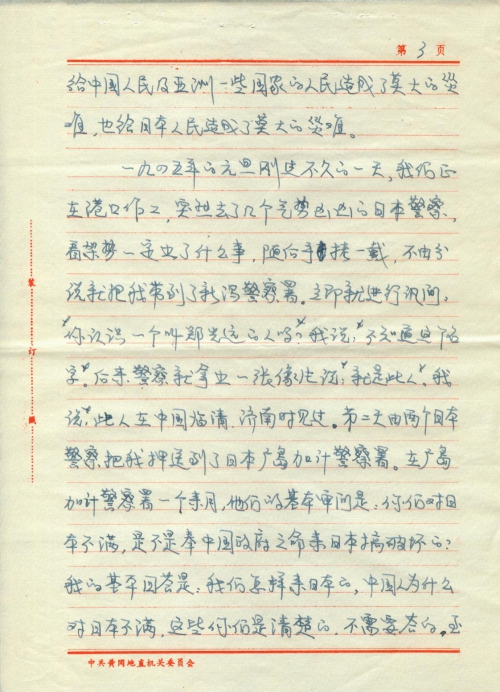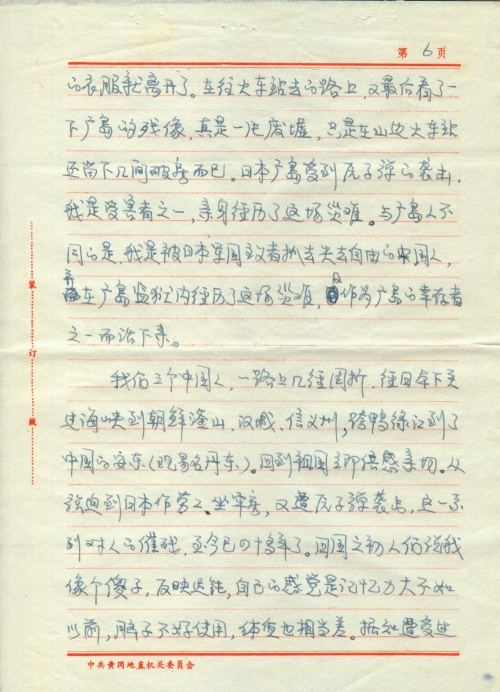Date of letter:1992
Address of author:Changsha City, Hunan Province
Date of event:1944-1945
Location of event:Hebei Province
Name of author:Zhang Wenbin
Name(s) of victim(s):Zhang Wenbin, Zhang Haotian, Gao Xuzhi, Zhao Qingzhu, Han Jie
Type of atrocity:Slave Laborers(SL)
Other details:My original name is Zhang Wenbin. During the wartime, I used alias Zhang Zhenyuan, and after capture I used the name Gao Qingzhen. In 1944 I was captured by the Japanese Army in the base area; back then those who were captured at the same time at Jinan Bank include Zhang Haotian, Gao Xuzhi, Zhao Qingzhu, and Hanjie; afterwards, we and others 300 people were transported to Japan as Slave Laborers. During this period, the Japanese Army said I was engaged in sabotage, and imprisoned me in Hiroshima prison. Everyday I was given only 100 grams of rice, and I also experienced atomic bomb explosion.
Professor Tong Zeng,
I’ve learned from reading the newspaper that you filed a claim to the National People’s Congress for civil compensation against Japan. You have done what my family intended to say,but couldn’t say for years. On behalf of our parents and other family members, we’d like to express our sincere gratitude and strong support to you, and we are sending a signature campaign form from my whole family to support your campaign of collecting 100 million signatures.
My whole family supports you because my father is a victim of Japan’s war of aggression against China. He was injured during the bombing of Hiroshima, Japan by the atomic bomb. Attached is a letter written by my father describing his suffering as a Slave Laborer and as a prisoner in Hiroshima, Japan during which he was Injured by the Atomic Bomb.
Professor Tong, we would like to ask you a question regarding how my father, a victim of the atomic bomb, could file a demand for compensation against the Japanese government. Could we file for compensation through lawyers dealing with foreign affairs? If possible, we’d like to ask you to refer us to a lawyer who handles foreign cases. The reason we ask this is because my father is getting old and we hope to settle this matter (regardless of the outcome) while he is still alive and can still remember his sufferings.
My whole family hopes you can take time to write a reply. Thank you very much.
Best regards,
Victim’s eldest son: Zhang Yiyun
Eldest daughter-in-law: Zhou Qin
May 28, 1992
Mailing address:
3F, No. 20, Shuyuan Road, Dachunqiao, Changsha, Hunan
Zhang Wenbin
Or Supervision Bureau, Ezhou, Hubei
Zhou Qin
Description of How I was Captured by Japanese Militarists during the War as a Slave Laborer and Injured by the Atomic Bomb When I was Imprisoned in Hiroshima, Japan
My given name was Zhang Wenbin. After the war broke out, I used the alias Zhang Zhenyuan, and later adopted the name Gao Qingzhen after I was captured by the Japanese.
On April 14, 1944, I was captured by Japanese invaders during a raid. At that time, I worked for the No.4 Branch of Ji’nan Bank under the fake name of Zhang Zhenyuan. Other people from my bank who were also captured include Zhang Haotian, Gao Xuzhi, Zhao Qingzhu and Han Jie. My captors held me in a police station in Linqing County, Shandong and I used the fake name of Gao Qingzhen. Over a month later, over 100 people who were held in the station were shipped to Ji’nan, Shandong and held in a place named Xinhuayuan where we learned that we were going to be sent to Japan as slave laborers.
In Ji’nan, I observed that the Japanese army was responsible for guarding the prisoners while the labor association of the puppet government was responsible for managing prisoners. Group after group of people were captured, their clothes changed, and then sent to Japan. In September 1944, over 300 people in my group were sent by ship to Shimonoseki, Japan across Qingdao, and then by train to Niigata Chinese Labors Management Office in Honshu, Japan.
At that time, Niigata was already quite cold. But we weren’t provided with quilted cotton clothes and enough food. We had to load and unload goods from ships and trains at the port every day. We were given only a bun, about 100g, to eat for each meal and we couldn’t get treatment when we got sick. Life was so unbearable. Many laborers died there. We also saw some Japanese people, mostly women, working there and their clothes and food were not much better than ours. It is palpable that Japanese militarists have caused a great hardship not only to Chinese people, but to the people of some other Asian countries, also, as well as the Japanese people.
One day shortly after January 1, 1945, while we were working at the port, several Japanese policemen came. We knew something went wrong. Suddenly, they handcuffed me and took me to the Niigata Police Station without giving any reason. I was immediately interrogated. “Do you know a person named Zheng Guangyuan?” I said, “I don’t know anyone by that name.” Later, a policeman took out a photo and said, “It is him.” I said, “He is from Linqing, China. I saw him in Ji’nan.” The next day, two Japanese policemen escorted me to the Police Station of Kake, Hiroshima, Japan. For over a month during my stay there, their question was basically, “You are resentful of Japan. Are you here to sabotage Japan at the behest of the Chinese government?” My answer was basically, “How did we come to Japan and why are the Chinese people resentful of Japan? You know the answers better than me. I don’t need to answer. As for sabotaging Japan, what did I sabotage? Do you have any evidence? No, you don’t.” The so-called witness was Zheng Guangyuan and the material evidence was a recording in my diary. One day, when I was working in Niigata, a worker, for no reason, was beaten by the supervisor of the Japan Port Authority. I stopped the supervisor and recorded this incident in my diary. And this became their material evidence. Then one day, a Japanese policeman asked me to take my belongings with me and transported me in an automobile, where I saw Zheng Guangyuan, Jia Dengchun and Zuo Baogui. Zuo Baogui looked to be very sick. Afterwards, we were taken to the Hiroshima District Court and each of us was sentenced to 5 years in prison for resenting Japan and planning sabotage. I was immediately put in a prison called China Prison in Hiroshima. There was a factory in the prison, so I still had to work. But the food was worse. We were only given a rice ball of about 100 kg for each meal. Under the rule of Japanese militarists, there is no room for justice.
On August 6, 1945, the supervisors didn’t ask the prisoners to take air-defense measures or to work, so we all stayed in our respective cell. At 8:15 a.m., I suddenly saw something like lightning outside the window, without hearing any loud noises. But it became dark immediately and the house collapsed. We realized it was an air raid, so we came out of the collapsed house and searched our way to the bomb shelter. Suddenly, the sky lit up. The people looked like coal miners with black hands and faces, the ground was black, the trees were dead and the houses in the prison collapsed, but there was no fire. The fences of the prison didn’t fall down. It was ablaze outside the fences. As Hiroshima Prison became unusable, the supervisors sent us to Yamaguchi Prison not far from Hiroshima. But days later, we three Chinese people were sent back to Hiroshima from Yamaguchi. The supervisors gave our belongings back to us and said, “The war is over. You can go home now.” We smiled. They didn’t say Japan surrendered, but we all knew. We changed into our own clothes and left. On our way to the railway station, I took a last look at Hiroshima. It was now a ruin. Only a few broken houses remained near the railway station of Yamaguchi. I was a victim and witness of the atomic bomb attack on Hiroshima. But different from the people in Hiroshima, I was a Chinese who lost freedom because I was captured and transported to Japan by Japanese militarists and experienced and survived the disaster in Hiroshima Prison.
With great difficulties, we three reached Andong, China (now Dandong) from Shimonoseki, Japan by crossing Pusan, Seoul and Lutheran of North Korea and the Yalu River. We instantly felt comfortable after returning to the motherland. It has been over 40 years since the series of events and torture happened, from being forced to work as a slave labor in Japan, to being held in a prison and to experiencing the atomic bomb attack. After I just returned home, other people said I was like a fool because I was slow. I myself felt my memory, brain and physique were worse than before. It’s often said that the people who have experienced atomic bomb attacks could suffer from an atomic disease, which affects not only themselves but their offspring. After I returned to China, I had a physical examination. The results showed that apart from a bad memory, my heart, red and white blood cells, liver, lung and stomach, etc. were all abnormal. I’ve received treatment for dozens of years. I haven’t been able to work since the 1970s and have spent a lot of money for treatment. The suffering is unspeakable. Now, my illness is becoming more serious as I am getting older. I am still shadowed by the atomic disease.
I condemn the Japanese militarists for crimes they committed when invading China. I strongly demand a compensation of USD 1 million from the Japanese government for my work as a slave laborer from April 1944 to October 1945 and for my physical suffering in Hiroshima Prison due to the atomic bomb attack.
Current name: Zhang Wenbin, now 71
Institution: Finance Bureau of Xiangtan, He’nan (retired at home)
Home address: 3F, No. 20, Shuyuan Road, Dachunqiao, Changsha, Hu’nan
Signatures of family members:
Zhang Wenbin Yuan Jianqing
Zhang Yiliang Zhang Xun Lv Lifeng
Zhang Li Yang Jinye Yang Qiliang
Zhang Yiyun Zhang Wei Zhou Qin


























